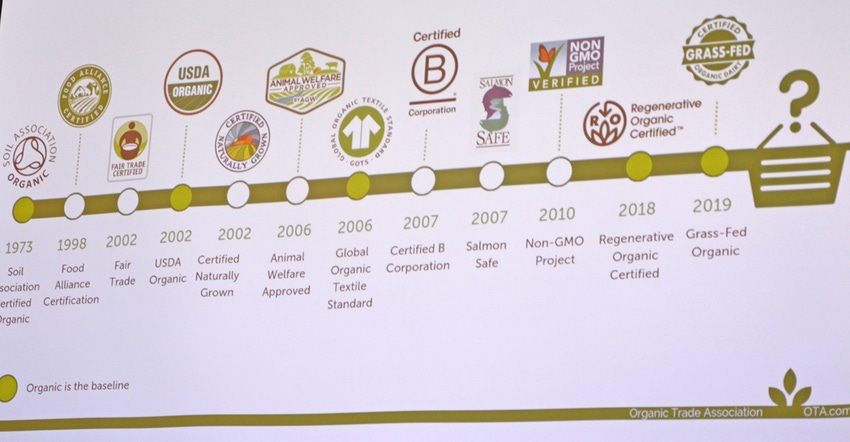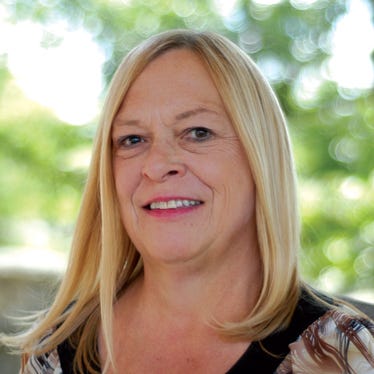
There are disagreements among avid supporters of organic production as to what growing methods should be allowed to carry the “certified organic” label.
Those viewpoints, especially the question of whether or not food grown by hydroponic farming methods should be eligible, were on display during a panel presentation April 7-9 at the annual North American Agricultural Journalists spring meeting in Washington, D.C.
Lee Krankel, executive director of the Coalition for Sustainable Organics, said that growing in soil doesn’t always make sense. There are areas where soils are poor, where rainfall is scarce and where growing conditions are not amenable to traditional fields of crops, he said.
“A hydroponic system lets you use 1% of the amount of water you would otherwise need,” he said. “The question I have is whether new labeling requirements on organics could blow out the USDA Certified Organic program’s reputation.”
Krankel said U.S. customers expect that foods that are labeled Certified Organic will be free of pesticides, hormones, antibiotics and GMOs.
“Where will we be in 2030?” he asked. “The original organic law, going forward, is about the social welfare of workers, the humane treatment of animals and the standards of organic production. Does the industry go by to Congress and try to evolve the label?”
David Chapman, executive director of the Real Organic Project, said hydroponic growers are attempted a “hostile takeover” of the organic industry.
“Organic is about the health of the soil and the health of the planet,” he said. “Agriculture has a big impact on climate change Healthy soil produces a healthy crop and healthy animals. People expect to go to the store and buy an organic tomato that was grown in soil, not by hydroponics.”
Chapman suggested that the “monied interests” have moved in to change the definition of organic in order to protect their own profits and insisted that allowing hydroponics to be labeled Certified Organic will diminish the meaning of the label.
Steve Etka, policy director for the National Organic Coalition, said that certification of non-soil crops is problematic because the organic laws require that crops qualifying for the label must be “fostering healthy soils.”
“Organic standards enhance biodiversity and environmental protection,” Etka said. “They require production systems that sequester carbon. The idea is to assure consumers that they are getting what they want. The organic label should be about continuous improvement. We should be using Certified Organic as the base and adding on labeling that tells consumers when there are higher standards.”
Laura Batcha, executive director of the Organic Trade Association, said that an organization that includes 9,500 operators is bound to face some problems.
“It is not about small and large and not as much about real organics but an extreme stance of anti-regulation,” she said. “Companies large and small can have a farm that is not organic, but can have containers sitting on concrete and their content is organic. There’s something ‘off’ about that.”
Batcha said she believes that the market will decide in the end. If consumers do not accept any steps down from organic rules and humane treatment of animals, then the industry will be forced to maintain standards that they will accept.
She said there are a limited number of rules that can be pushed without regulations beginning to strangle small growers.
 TALKING LABELS: Lee Frankel, left, executive director of the Coalition for Sustainable Organics talks about labeling standards as the rest of the panel looks on. Seated from left are Dave Chapman, executive director of the Real Organic Project; Steve Etka, policy director for the National Organic Coalition and Laura Batcha, executive director for the Organic Trade Association.
TALKING LABELS: Lee Frankel, left, executive director of the Coalition for Sustainable Organics talks about labeling standards as the rest of the panel looks on. Seated from left are Dave Chapman, executive director of the Real Organic Project; Steve Etka, policy director for the National Organic Coalition and Laura Batcha, executive director for the Organic Trade Association.

“If you use regulations as a supply management tool, then you are going to see supplies get really small or really large,” Batcha said.
Her concern about container growing is that labeling Certified Organic should only be allowed if the surrounding farming operation is also organic.
The panel also expressed concerns about how organic labels play out in import and export markets. There are countries with stricter standards for organic labeling, and others whose standards are more lenient than the U.S., particularly in allowing organic labels on meat from animals that have been treated with therapeutic antibiotics.
There are also concerns about “fake” organics entering the U.S.
“Organic is a consumer-driven label, and we do have to be aware that we put ourselves into a position of distrust of all organics as a result of import fraud,” Batcha said.
About the Author(s)
You May Also Like






